Journey to the Core of Zakk Wylde’s Pentatonic Shred
All the latest guitar news, interviews, lessons, reviews, deals and more, direct to your inbox!
You are now subscribed
Your newsletter sign-up was successful

With the release of Ozzy Osbourne’s No Rest for the Wicked in 1988, a sound was unleashed on the world that changed the lexicon of rock guitar and redefined the meaning of “Guitar God."
Plucked from anonymity in Jackson, New Jersey, at age 20, Zakk Wylde (formerly Jeff Wielandt) forged a new path of style, personality and tone that continues to grow and evolve to this day. Zakk Wylde is an amalgam of his influences, performed with his own personal "Jersey fury." Zakk was (and is) a bull in a china shop with a guitar in its hands, with an appetite to devour and regurgitate licks and tricks learned from masters such as Randy Rhoads, Tony Iommi, Eddie Van Halen, Al Di Meola, Jimi Hendrix and (especially) John Sykes and Frank Marino.
Add to that a massive, unique tone achieved with a minimal amount of carefully selected, effective tools and it’s easy to see how so many guitarists respect and admire him, and how no generation of guitarists that has followed him has not been influenced and inspired in one way or another by his contributions to the vocabulary of modern guitar (the prevalence of heavily vibrato'ed pinch harmonics on the low strings, for example—usually the third, fifth or sixth fret of the lowest string—is almost a cliché in today’s modern metal, but you didn't hear them a lot before the song “Crazy Babies” was released).
Other than tone, huge riffs and sheer style, Zakk’s major contribution to the guitar world was his use of pentatonic scales in previously unheard of ways. When Zakk first came on to the scene in the late Eighties, three-note-per-string scales and sweep picking were the norm, and only (then) underground players like Eric Johnson were using creative manipulation of pentatonic scales to define their individual niche.
Zakk had his own take on the pentatonic scale that helped him forge his own style that has continued to develop over his long career, yet at the core of that style/take on performing that scale, there are a few simple patterns that define the fundamentals on upon which the whole of the “Zakk style” is built. Boiled down to its most basic form, the Zakk Wylde-style of executing fast pentatonic licks can be found in EXAMPLE 1A, 1B and 1C.
Using an A minor pentatonic scale (A, C, D, E, G), EXAMPLE 1A is the simplest dilution of Zakk’s trademark licks, simply running a two-notes-on-two-strings pattern fretted with the ring and index fingers. Be careful not to barre the 17th fret to cover both strings. Instead, “walk” the index finger from string to string when necessary.
The lick will be much cleaner and more articulate for it, and with sufficiently aggressive pick attack (You can really dig in since it’s always a downstroke when you switch strings), you’ll be ready to channel the Wylde in you in no time! EXAMPLE 1B manipulates the pattern to work as sextuplets (six per beat. Say: “O-zzY-O-zzY-Os-Bourne”), and example 1C changes it slightly more into a syncopated pattern.
All the latest guitar news, interviews, lessons, reviews, deals and more, direct to your inbox!
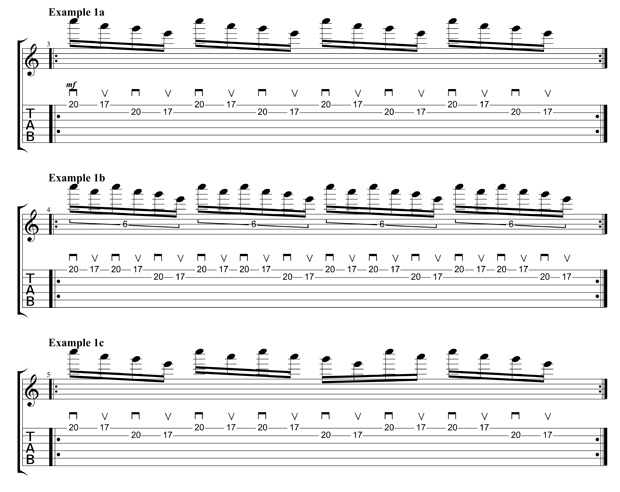
Zakk likes to add more interest to these patterns by adding in the next higher note adjacent to the pattern. In this case, it’s the D note on the high E string, 22nd fret, fretted with the pinky. EXAMPLES 2A-C shows this “afterburner” (as Zakk calls it) in action.
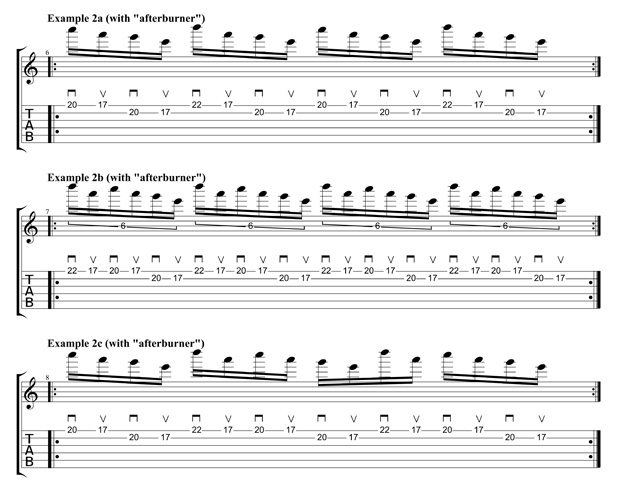
EXAMPLE 3 is a six-note pattern descending the scale three strings at a time. The first example is the six-note pattern played with a 16th (four per beat) note rhythm. The cool thing to note here is that the start of each group of six doesn’t coincide with the downbeat. EXAMPLE 3B shows what it looks like relative to the beat if it were played as sextuplets.
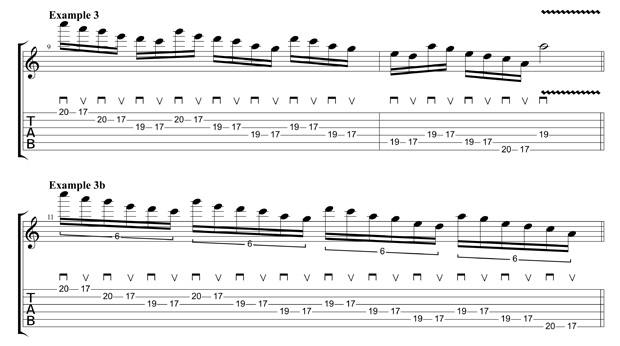
EXAMPLE 3C and 3D mirror the previous examples not only in terms of their rhythmic difference, but with their directions reversed as well.
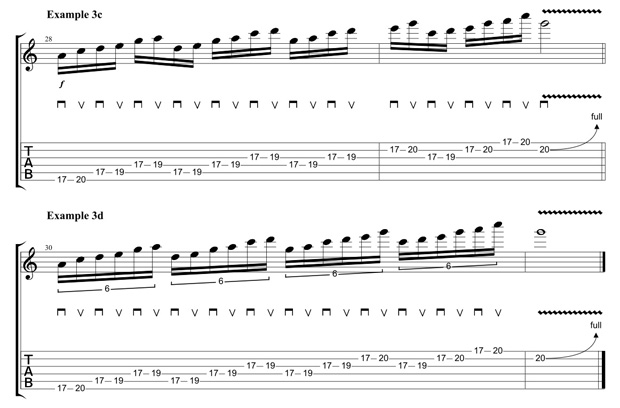
EXAMPLE 4A is an Am pentatonic scale moving up the neck through all of its positions/shapes, culminating in EXAMPLE 4B, where a six-note pattern is syncopated as 32nd notes, bringing an epic climax to the whole line through its switch of rhythm and intervallic complexity. Be sure to add a fast, wide vibrato to the bend on the last note.
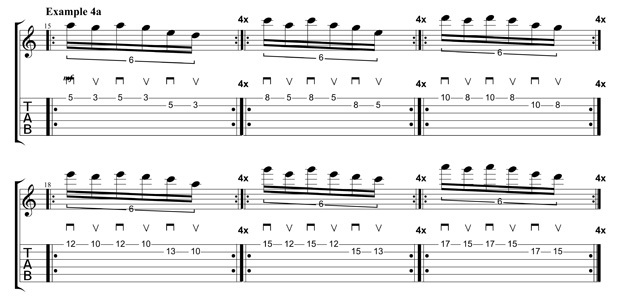
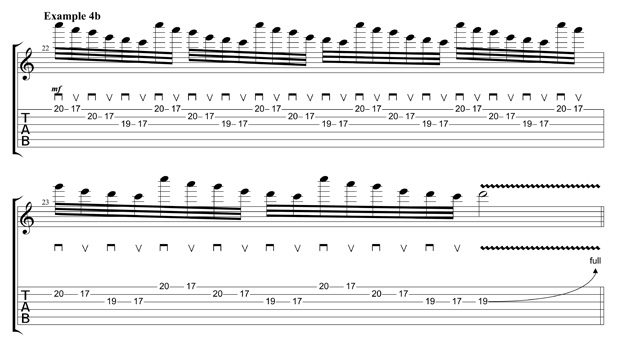
EXAMPLE 5 moves the trusty pentatonic shapes to D minor and employs the use of economy picking. Fretted with the pinky, ring and index fingers, the lick moves though Dm pentatonic (D, F, G, A, C) and D Blues (D, F, G, G#, A, C) and requires that you mix alternate and sweep picking to properly execute it. To start the pattern, you’ll begin on a downstroke, but as the pattern repeats, you’ll need to perform the first note of the pattern with an upstroke.
This is easy, though, since the economy picking will set that upstroke as the only option. To perform the lick, pick the first note, do the pull-offs, then pick “down-up-down” on the B string, and then let your pick follow gravity and fall through the B toward the high E string, coordinate your pick “pushing through” the high E index finger anchor note, then come around with an upstroke (with your pinky fretting the first note of the pattern) and repeat. For extra Zakk-style attitude, be sure to finish off the lick with the pull-down bend on the G string, 17th fret, the ensuing simultaneous grab of the B string, 17th fret and shaking it like you mean it!
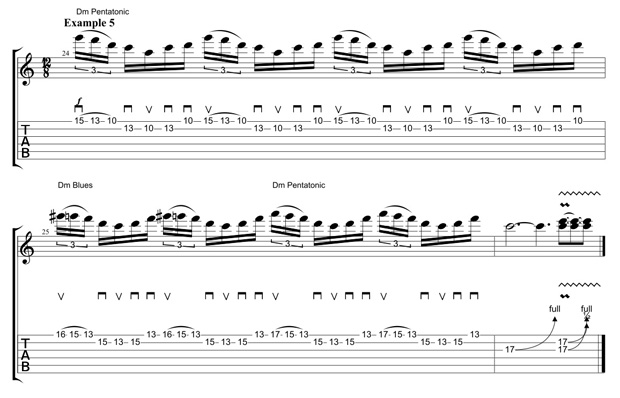
I am confident this will let you channel the spirit and style of Zakk Wylde and that you’ll find a way to work these into your own solos. Happy shredding!
Scott Marano has dedicated his life to the study of the guitar, honing his chops at the Berklee College of Music under the tutelage of Jon Finn and Joe Stump and working as an accomplished guitarist, performer, songwriter and in-demand instructor. In 2007, Scott developed the Guitar Strength program to inspire and provide accelerated education to guitarists of all ages and in all styles through state-of-the-art private guitar lessons in his home state of Rhode Island and globally via Skype. Visit Scott and learn more at GuitarStrength.com.
Scott Marano has dedicated his life to the study of the guitar, honing his chops at the Berklee College of Music under the tutelage of Jon Finn and Joe Stump and working as an accomplished guitarist, performer, songwriter and in-demand instructor. In 2007, Scott developed the Guitar Strength program to inspire and provide accelerated education to guitarists of all ages and in all styles through state-of-the-art private guitar lessons in his home state of Rhode Island and globally via Skype.
